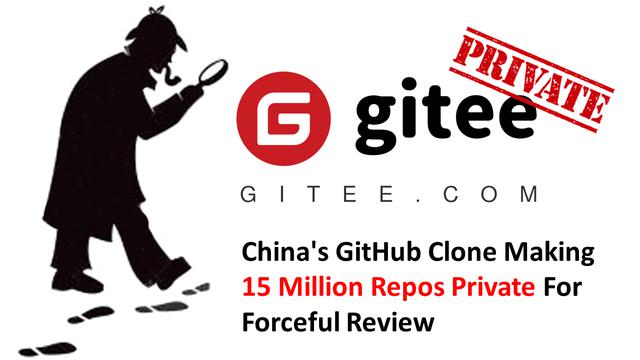China’s approved GitHub clone, Gitee, has warned users that it will make all existing repositories private pending a mysterious review of their content.
Gitee offers Git and Apache Subversion as a service. But while GitHub has occasionally been banned in China, Gitee was anointed as China’s designated open source development hub in 2020, after the nation’s Ministry of Industry and Information Technology conducted a bidding process.
The Reg keeps an eye on Gitee and sees a steady stream of blog posts about product and service updates, plus news of open source software in China. The service is sufficiently committed to the cause of open source to have signed up to mirror Linux Foundation code and is thought to have around eight million users.
The company published news of its code review requirements on a platform called Zhihu.com, a Q&A service similar to US-based Quora.
Machine translation of Gitee’s Zhihu post states “All newly launched open source warehouses need to be manually reviewed before they can be officially released.”
Existing “warehouses” will be made private, then restored to public status after review.
The posts states that Gitee is adding resources to ensure minimal inconvenience for users and is frustrated by the need to do so.

But the post is silent on why Gitee has implemented code reviews.
China is usually positive towards open source software. In early 2022, official interpretation of China’s 14th five-year plan called for China to work with other nations in pursuit of a richer open source ecosystems and to standardise licenses, laws, and markets. In 2021 Beijing urged the nation’s financial services companies to use more of it and participate in open source projects.
China is also reliant on open source software: its web giants attribute their rapid growth to the availability of OpenStack and are significant contributors to the project.
As The Register’s many stories about China’s new content regulations demonstrate, Beijing is not shy about publishing new regulations. But the sites that usually carry such announcements – the Cyberspace Administration of China and the Ministry of Industry and Information Technology – offer no recent announcements of open source regulation or policy.
So while it assumed that Gitee is conducting reviews because it’s been told to do so, the source of any such edict and its requirements are obscure.
The Register’s has two theories for Gitee’s stance.
One is that Beijing is worried that sensitive tech has made it into the public domain, so must be retrieved.
The other is that developers have used Gitee to post content that would be easily noticed – and censored – on social media – but may have gone unnoticed as code comments or inside other files on Gitee.
We’ve asked Gitee to explain its stance and will update this story if we receive a substantive response. ®
Get our Tech Resources



